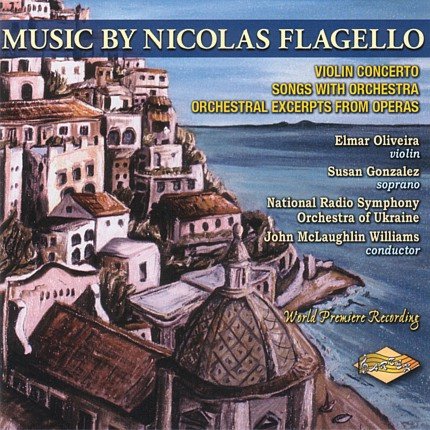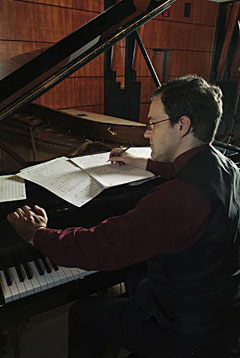 Music by Nicolas Flagello
Music by Nicolas Flagello
National Radio Symphony Orchestra of Ukraine
John McLaughlin Williams, conductor
Elmar Oliviera, violin
Susan Gonzalez, soprano
Artek 0036-2
Nicolas Flagello (1928-1994) was born in New York City, earned a Bachelor’s and Master’s degree from the Manhattan School of Music and, upon graduation, taught there until 1977.
Flagello’s music is romantic and firmly built on 19th century models with lush orchestrations and long melodic phrases. The Symphonic Aria from 1951 is moving, but sometimes too rich. Mirra (1955) concludes with an exciting “Dance” that allows the orchestra to show a lot of meat.
Many of the works were orchestrated post facto by Anthony Sbordoni, including a Violin Concerto, and several songs for soprano, featuring Susan Gonzalez. Flagello is a good writer for the voice, and sensitive to the text in his prosody and harmonic textures. The CD concludes with two songs, Polo and Polo II, and the liner notes indicate that the “polo is a genre of flamenco song of Arabian origin.” Both draw heavily on folk elements.

The Return
Andrey Dergatchev
ECM 1923
There are few film scores that stand alone as “concert” works. I’ve often felt that the best film music should either go unnoticed to the average viewer or play a prominent role in the film (The Red Violin). Music in film should enhance the overall experience, which combines with visual artistry and dialogue/monologue.
That said, the music by Andrey Dergatchev needs the film to be fully appreciated. I suppose if any composer were to peddle their notes before a film, we all might have a different opinion of the music. In this case, I’ve never seen the film, so I was absorbing this ECM release as an electro-acoustic composition (sans movie).
Several tracks use spoken word from the picture, and it’s in Russian, so I didn’t understand anything. If you’ve seen The Return, this CD will make a nice souvenir.
 Nostalghia – Song for Tarkovsky
Nostalghia – Song for Tarkovsky
François Couturier, with
Anja Lechner
Jean-Marc Marché
Jean-Louis Matinier
ECM 1979
Moving from music for film, to music inspired by film, we have François Couturier’s tribute album to Russian film-maverick Andrei Tarkovsky (1932-1986).
According to the composer, Tarkovsky felt that film does not require music (I usually agree), and so Nostalghia has very little music. This CD is inspired by all of Tarkovsky’s films, with each movement representing “a specific emotion linked to the universe of this director.” (As a side note, Tarkovsky produced a successful Boris Godunov in 1984 for Covent Garden.)
The performing ensemble consists of the composer, François Couturier at the piano, Anja Lechner, cello; Jean-Marc Larché, soprano saxophone; and Jean-Louis Matinier, accordion. The scores are bare and thin, slow and melancholic, and the instrumental textures can be exciting, on occasion. Couturier makes reference to two of Tarkovsky’s favorite composers: Bach and Pergolesi, and also throws in Schnittke for good measure.
 The
The 
 First Jeff Harrington, then David Salvage, and now our very own
First Jeff Harrington, then David Salvage, and now our very own  The Los Angeles Master Chorale gave the premiere of a new work by
The Los Angeles Master Chorale gave the premiere of a new work by  For the past 27 years, the Mexican-born pianist and composer
For the past 27 years, the Mexican-born pianist and composer  Music by Nicolas Flagello
Music by Nicolas Flagello
 Nostalghia – Song for Tarkovsky
Nostalghia – Song for Tarkovsky Born in Boston and a product of Berklee, the New England Conservatory and Bard, Amos now makes his home in Tel Aviv. He was one of the brave few “serious” composers that took the online plunge early; I first bumped into him and his music way back in 1999 or 2000 on the old MP3.com. His work has a touch of the modern Romantic, chromatic and sharp, though the lyrical is never too far away.
Born in Boston and a product of Berklee, the New England Conservatory and Bard, Amos now makes his home in Tel Aviv. He was one of the brave few “serious” composers that took the online plunge early; I first bumped into him and his music way back in 1999 or 2000 on the old MP3.com. His work has a touch of the modern Romantic, chromatic and sharp, though the lyrical is never too far away.